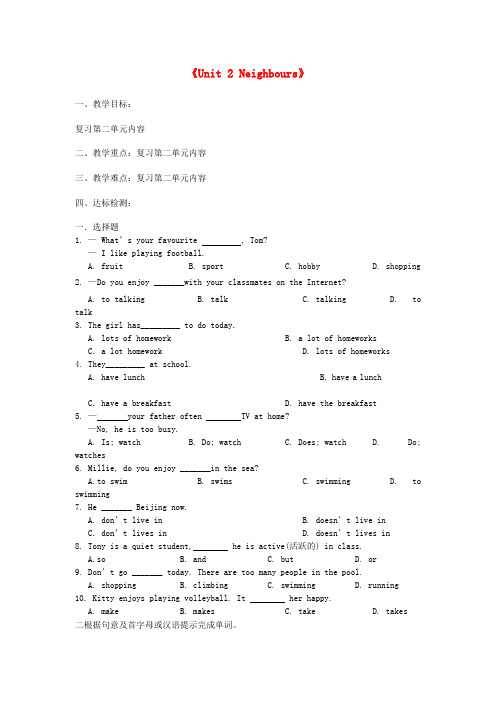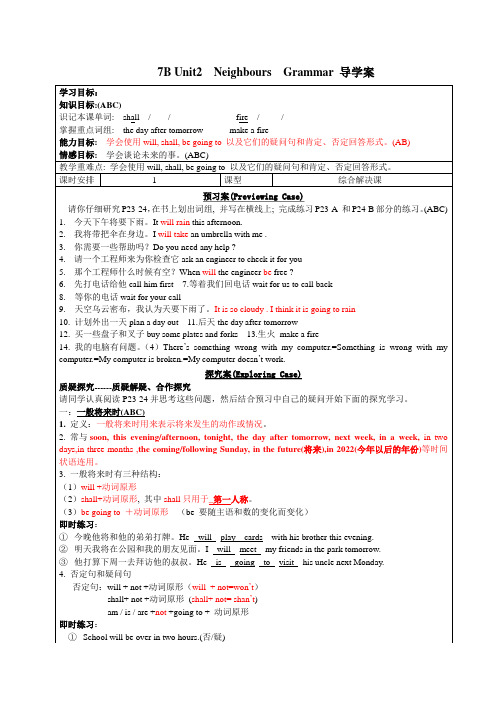七年级英语下册Unit2NeighboursGrammar导学案(新版)牛津版
- 格式:doc
- 大小:62.00 KB
- 文档页数:5

7 B Unit2 NeighboursReading学习目标能正确朗读单词和课文能了解有关社区中心的知识能建立邻里之间互帮互助的理念能用英语介绍社区中心的活动内容重点词汇:helpful; community; skill; problem; something; engineer; check; broken; someone; fix; anyone; college; lucky; volunteer重点短语:learn more about sth./sb. 了解更多有关某人某事be kind and helpful 友好且乐于助人meet at the community centre在社区中心集合share their different skills分享他们不同的技能ask a computer engineer to check it 叫一个电脑工程师来检查它be broken坏了 ask some one to fix it 叫人去修理它find sb. to do sth.找到某人去做事 some college students一些大学生help you with your homework在家作方面帮助你visit the old people拜访老人 do some shopping购物clean their flats打扫他们的公寓 be lucky to do sth.做某事很幸运重点句型:(1) What are your neighbours like ? 你的邻居怎么样?(2) They help us with all kinds of problems. 他们帮助我们解决各种各样的问题。
(3) There’s something wrong with my computer. 我的电脑坏了。
(4) I’m going to ask a computer engineer to check it. 我打算叫一个电脑工程师来检查一下。

教学资料范本【2020最新】七年级英语下册 Unit 2 Neighbours Grammar教案(新版)牛津版编辑:__________________时间:__________________教学目标1、能用will、shall和be going to表示将来。
2、能正确使用一般将来时的肯定、否定、疑问式和肯定、否定回答。
3、能用正确的表达方式谈论将来的计划和打算。
教学内容四会内容词汇:shall fire 词组:the day after tomorrow make a fire 教学准备实现写好的纸条。
教学步骤 A simple future tense with will and shallStep I 复习2、通过创设语境,帮助学生复习课文,并为下面的学习做准备Step II 呈现1、教师为学生创设情境,其噶他们用will和shall来表达自己的观点。
2、教师引导学生通过黑板上的例句来理解本课时语法项目。
3、利用黑板上的例句,教师可以继续呈现。
4、指导学生认真阅读A部分,并介绍will和shall的用法。
5、指导学生看A部分,鼓励他们自主探究并总结变化规则。
Step III 操练1、指导学生完成A部分中的练习,巩固所学知识。
2、安排学生朗读对话。
3、教师为学生提供更多情境,两人一组来问答,练习用will和shall来表达。
Step I 1、教师通过语言描述学生创设情境,2、接着教师引导学生看黑板上的例句并引导他们理解be goingto的用法。
启发学生自我总结或看B部分的说明并告知学生用法。
3、创设情境与学生交流,呈现be going to的疑问句和肯定、否定回答,4、指导学生看B部分,鼓励自主探究并总结变化规则。
Step II 操练。

《Unit 2 Neighbours》一、教学目标:复习第二单元内容二、教学重点:复习第二单元内容三、教学难点:复习第二单元内容四、达标检测:一.选择题1. — What’s your favourite , Tom?— I like playing football.A. fruitB. sportC. hobbyD. shopping2. —Do you enjoy _______with your classmates on the Internet?A. to talkingB. talkC. talkingD. to talk3. The girl has_________ to do today.A. lots of homeworkB. a lot of homeworksC. a lot homeworkD. lots of homeworks4. They_________ at school.A. have lunchB. have a lunchC. have a breakfastD. have the breakfast5. — your father often TV at home?—No, he is too busy.A. Is; watchB. Do; watchC. Does; watchD. Do; watches6. Millie, do you enjoy _______in the sea?A.to swimB. swimsC. swimmingD. to swimming7.A. don’t live inB. doesn’t live inC. don’t lives inD.8. Tony is a quiet student, he is active(活跃的) in class.A.soB. andC. butD. or9. Don’t go _______ today. There are too many people in the pool.A. shoppingB. climbingC. swimmingD. running10. Kitty enjoys playing volleyball. It her happy.A. makeB. makesC. takeD. takes二根据句意及首字母或汉语提示完成单词。



《Unit 2 Neighbours 》导学案Step 1 Pre-readingNew words:helpful _______________ volunteer_______________community_____________ skill___________________problem________________ something______________ engineer________________ check__________________ broken_________________ someone_______________ fix ____________________ anyone________________college _________________ lucky_________________help with sth _____________ do some shopping ____________Step 2 While-readingLevel 1 Read the dialogue quickly and answer the question.What does Simon’s community center have at the weekend?________________________________________________________ Level 2 Listen carefully and answer the following questions.1.What are Simon’s neighbours like?__________________________________________________________ 2.What do the volunteers do at the comm unity center? ___________________________________________________________Level 4 Read the dialogue silently and finish the form.People Problems How do the volunteers help them?the old people The old people need help.the boy His homework is difficult.Anniehelp the girl fix the bicycle Simon help the boy checking the computer My neighboursMy neighbours are kind and h_________. Some of them are volunteers. They have different s________ and often help us with all k________ of problems.Usually there is a “helping hands” meeting a t the w_________ .People go there when they need help with their p________ . Computer e__________ are popular. They help people c_________ their computers. You can also find someone to f__________ things like b____________ bicycles.Students can get help with their h ________. There are some c__________ students among the volunteers, and they are always ready to help. V olunteers also help the old people.We are l________ to live in a neighbourhood like that. People here are like a big family.Step 3 Post-readingGroup workNow you’re a vol unteer at your community center, what will you do to help your neighbours?_____________________________________________________________ _____________________________________________________________ _____________________________________________________________ DiscussionIf you are Pleasant Goat, you want to be good neighbours with the Big Wolf, what will you say to him?________________________________________________________________________________________________________________________ WritingWrite a short passage about “My neighbours”._____________________________________________________________ _____________________________________________________________ _____________________________________________________________ _____________________________________________________________ _____________________________________________________________ _____________________________________________________________ _____________________________________________________________ _____________________________________________________________ _____________________________________________________________教师的职务是‘千教万教,教人求真’;学生的职务是‘千学万学,学做真人’。
7B Unit2 NeighboursGrammar学习目标:能用will, shall和be going to表示将来能正确使用一般将来时的肯定、否定、疑问形式和肯定、否定回答重点词汇:shall; fire重点短语:be sure to happen一定会发生 watch the film 看电影take an umbrella with sb. 随身带伞 plan a day out 计划一日出行wait for us to call back 等我们回电话 wait for your call等你的电话make a fire 生火 the day after tomorrow 后天some plates and forks 一些盘子和叉子 cook some food煮一些食物语法点:一般将来时(1)基本概念表示将来某个时间要发生的动作或存在的状态,常与一些表示将来的时间状语连用。
例如:I am going to / will watch a football match on TV this evening.今天晚上我将在电视上看一场足球比赛。
(2)基本结构a. “助动词will+动词原形” (will是助动词,不能独立使用,前面的主语不管是什么人称,其后总用will。
在名词或代词后常简缩为’ll,并与主语连写在一起。
will的否定形式是will not,缩略形式是won’t)。
b.“be going to+动词原形” (be going to结构中的be动词很少用原形,它一般有三种形式,即:am,is,are。
当主语是I时用am;当主语是第三人称单数时用is;当主语是其他人称时用are。
)例如:I am going to buy something tomorrow morning.明天早上我打算去买些东西。
He is going to see Mr Wang this afternoon. 她打算今天下午去看望王先生。
7 B Unit 2 NeighboursTask学习目标:掌握写作技能学会对他人施以援助之手重点短语:带某人参观某地 show sb. around…互相认识 know each other住像这样的房子 live in houses like this 嗅到花香 smell the flowers这儿的大多数人 most people here 听鸟儿唱歌 hear the birds sing一百个家庭 one hundred families 饲养牛 raise cows一些……其他的…… Some, … others…种小麦 grow wheat开车带我们那儿去购物drive us there to do some shopping一个居住的好地方 a wonderful place to live重难点:1.They will make you feel better! 他们将使你感觉更好些。
●make sb。
do sth. “使某人做某事”His mother makes him (stay) at home。
(呆在家)●make sb。
/sth. +形容词,使某人/某物…….He makes us .(高兴)2。
Are you worrying about what to wear to a party or how to design your home?你正为聚会穿什么或怎样设计你的家而苦恼吗?●what to wear和 how to design your home是“疑问词+不定式”结构●worry about sb。
/sth。
=be worried about sb。
/sth。
“担心某人/某物"课堂检测:一、汉译英1. 离……远 _________2. 在将来 _________3。
听起来像是个好主意 _________ 4。
在镇中心 ______5。
她的哥哥 ______ 6. 擅长绘画 _________二. 用所给词的适当形式填空1. They ________ (finish) the work in two weeks。
牛津译林版英语七下Unit 2《Neighbours》(Grammar)教学设计一. 教材分析牛津译林版英语七下Unit 2《Neighbours》主要讨论了与邻居相关的日常交流情景。
通过本单元的学习,学生将掌握如何描述邻居的特点、交流邻居之间的互动以及表达自己对邻居的看法。
本单元的核心语法是现在进行时态,用于描述正在进行的动作或状态。
此外,学生还需熟悉和掌握一些与邻居相关的词汇和表达方式。
二. 学情分析七年级的学生已经具备了一定的英语基础,能够听、说、读、写一些简单的英语句子。
但他们在使用现在进行时态和描述邻居特点方面可能存在一定的困难。
因此,在教学过程中,需要关注学生的个体差异,有针对性地进行教学。
三. 教学目标1.知识目标:–掌握现在进行时态的用法;–学会描述邻居的特点和交流邻居之间的互动;–学会表达自己对邻居的看法。
2.能力目标:–能够熟练运用现在进行时态进行日常交流;–提高听力、口语、阅读和写作能力;–培养合作意识和团队精神。
3.情感目标:–增强对英语学习的兴趣;–学会尊重和理解他人,培养良好的邻里关系。
四. 教学重难点•现在进行时态的用法;•描述邻居特点和交流邻居之间的互动;•表达自己对邻居的看法。
•现在进行时态的运用;•准确描述邻居特点和交流邻居之间的互动。
五. 教学方法1.情境教学法:通过设定真实的邻里场景,让学生在实际语境中学习和运用英语;2.交际教学法:鼓励学生进行角色扮演,模拟邻里之间的交流,提高口语表达能力;3.任务型教学法:通过完成小组任务,培养学生合作意识和团队精神;4.反馈与激励:及时给予学生反馈,鼓励学生积极参与课堂活动。
六. 教学准备1.教材:牛津译林版英语七下Unit 2《Neighbours》;2.多媒体课件:图片、视频、音频等教学资源;3.学习任务单:用于引导学生进行小组讨论和任务完成;4.板书用品:黑板、粉笔等。
七. 教学过程1.导入(5分钟)利用图片或视频展示邻居之间的日常生活场景,引导学生谈论自己的邻居。
七年级英语下册Unit 2 Neighbours导学案(牛津译林版)导学目标•了解并掌握Unit 2 Neighbours的重点词汇和短语;•学会使用There be句型描述房间内物品和位置;•学会运用指示代词this和that,及these和those进行物品的指示;•了解并正确使用物主形容词的用法;•学会用英语询问和描述人物的外貌特征。
重点词汇和短语•neighbour: 邻居•describe: 描述•appearance: 外貌•hair: 头发•long: 长的•short: 短的•tall: 高的•short: 矮的•thin: 瘦的•fat: 胖的语法点There be 句型•There be句型用来描述某个地点存在什么人或物,表示“某处有”。
•句型结构:There is/are + 名词 + 地点。
•当地点是单数时,使用there is;当地点是复数时,使用there are。
指示代词•指示代词this指的是离说话人较近的一个人或物;•指示代词that指的是离说话人较远的一个人或物;•指示代词these指的是离说话人较近的多个人或物;•指示代词those指的是离说话人较远的多个人或物。
物主代词•物主代词用来表示所属关系,常用的物主代词有my, your, his, her, its, our 和their。
•物主代词可以直接修饰名词,也可以在名词前加形容词修饰。
学习任务任务一:词汇和短语练习请根据下列句子的意思,选择合适的词汇或短语填入横线上。
1.My ______ is very tall. He plays basketball very well.–[ ] neighbour–[ ] describe–[ ] appearance2.She has ______ hair. It’s beautiful.–[ ] long–[ ] short–[ ] tall3.He is very ______. He exercises a lot.–[ ] thin–[ ] short任务二:语法练习请填入合适的词填空,并给下列句子选择正确的答案。
7B Unit2 NeighboursGrammar学习目标:能用will, shall和be going to表示将来能正确使用一般将来时的肯定、否定、疑问形式和肯定、否定回答重点词汇:shall; fire重点短语:be sure to happen一定会发生 watch the film 看电影take an umbrella with sb. 随身带伞 plan a day out 计划一日出行wait for us to call back 等我们回电话 wait for your call等你的电话make a fire 生火 the day after tomorrow 后天some plates and forks 一些盘子和叉子 cook some food煮一些食物语法点:一般将来时(1)基本概念表示将来某个时间要发生的动作或存在的状态,常与一些表示将来的时间状语连用。
例如:I am going to / will watch a football match on TV this evening.今天晚上我将在电视上看一场足球比赛。
(2)基本结构a. “助动词will+动词原形” (will是助动词,不能独立使用,前面的主语不管是什么人称,其后总用will。
在名词或代词后常简缩为’ll,并与主语连写在一起。
will的否定形式是will not,缩略形式是won’t)。
b.“be going to+动词原形” (be going to结构中的be动词很少用原形,它一般有三种形式,即:am,is,are。
当主语是I时用am;当主语是第三人称单数时用is;当主语是其他人称时用are。
)例如:I am going to buy something tomorrow morning.明天早上我打算去买些东西。
He is going to see Mr Wang this afternoon. 她打算今天下午去看望王先生。
c. shall+动词原形(只可用于第一人称,主语是第一人称I; we 时,常用助动词 shall + 动词原形。
否定形式是shall 后加not构成,shall not可缩写成shan’t。
)例如:We shall be very happy if you accept it. 如果你接受了它,我们将会很高兴。
I shall write you a letter next month. 下个月我会给你写信。
We shan’t be in the same room all day. 我们不会整天待在同一房间里。
(3)常用的时间状语a. 由tomorrow组成的, 如:tomorrow morning/evening明天早晨/晚上, the day after tomorrow后天b. 由next组成的, 如:next week (Tuesday/Sunday/month, year …)c. 由this 组成的, 如:this afternoon/evening今天下午/晚上d. 由in组成的, 如:in + 时间段(in two hours/in a few days), in the future在未来e. 其它:soon, from now on例如:Tom will come back in two days.汤姆两天后回来。
I’ll be more careful from now on.从现在起我会更加小心的。
(4)基本句型a. “助动词will+动词原形”●肯定句: 主语+will+动词原形+其他He will come here at once.他马上来这儿。
●否定句: 主语+ will + not + 动词原形+其他He will not(won’t)go to the party.他不去参加聚会。
●一般疑问句: Will+主语+动词原形+其他?Will he help you with your English? 他会帮助你学习英语吗?其答语为:Yes,主语+shall/will. /No,主语+shan't/won't..●特殊疑问句:疑问词+一般疑问句?—What will the students have for lunch today? 学生们今天午饭吃什么?—They will have bread.他们将吃面包。
b.“be going to+动词原形”●肯定句: 主语+be going to+动词原形+其他We are going to climb the hill this afternoon.我们打算今天下午去爬山。
●否定句: 主语+be + not + going to+动词原形+其他He isn’t going to do morning exercises tomorrow.明天他不去做早操。
●一般疑问句: Be动词(Am,Is,Are)+主语+going to+动词原形+其他?Are you going to play computer games tomorrow afternoon?你打算明天下午玩电脑游戏吗?其答语为:Yes,主语+am/is/are./No,主语+isn't/aren't./No,I'm not.另外,I am…在改为一般疑问句时常常改为“Are you…?”。
课堂检测:一、根据所给词,用一般将来时完成句子1. David_______________(help)Amy with her homework this evening.2. The Wang family_________________(have)a holiday soon.3. It_______________(be) cold tomorrow.4. Grandpa and Grandma_______________(come)to see us this weekend.5. Next year the school_______________(have) a new basketball court.6. They_______________(not have) a farewell party next Monday.二、英汉互译1.this afternoon_____________ 4.下周二____________2. the day after tomorrow __________ 5. 谈论_____________3.this Sunday ______________ 6.郊游一天____________三、句型转换1.Nancy is going to study French.(否定句)Nancy_____________________study French.2. I will go and join them. (否定句)I _____________go____________join them.3.We will meet at the bus stop at 10.30a.m.(一般疑问句)____________ ____________meet at the bus stop at 10.30a.m?4.My father and mother are going to see a play the day after tomorrow.(对画线部分提问)_____________ ___________going to see a play the day after tomorrow?四、根据中文,完成句子1.我打算明天和朋友去野炊。
I __________ ____________ ____________have a picnic with my friends.2.下周一我们将要去打篮球。
We __________ ___________ __________play basketball next Monday.3.你母亲这个周末去购物吗?_____________your mother_________ ___________go shopping this____________?4.你们打算什么时候见面?What time________you__________ _________meet?5.我认为今晚不会下雨。
I _________think it_________ _______tonight.6.我表姐不想参加我们。
My cousin would___________ __________ _____________ ___________us.7.我该乘哪辆车?_______________bus___________I______________?8.我们将在街对面向左转。
We____________ ________ ___________ at the other side of the road.答案:一.1.will help2. will have3. will be4. will come5.will have6. won’t have二.1.今天下午2. 后天3. 这周日4.Next Tuesday5. talk about6. plan a day out三.1.isn’t going to2.won’t;go3. Will you4. Who are四.1.am going to2. are going to3. Is; going; to; weekend4.are going5. don’t; will rain6. not like to join7.Which; shall; take 8. will turn left。